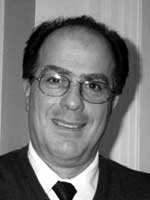Education and Philosophy:
The Abraham Lincoln School
by Marie Holmes
Howard Schott adores his job. He reads the Bible, Plato’s Republic and other canonical works to elementary and middle school students, teaches 7th grade science, and also serves as Headmaster of the eight year-old Abraham Lincoln School (ALS).
ALS is affiliated with the School of Practical Philosophy with which it shares a building, as well as a group of schools in several different countries. The Abraham Lincoln School, housed in an East Side townhouse, began in 1975 as a playgroup for parents who were members of the School of Practical Philosophy (founded in 1964). Although the K-8 Abraham Lincoln School wasn’t founded until much later, “it was a hot item on my mind in 1977, because my daughter was graduating [from the] Ark,” says Schott, who was teaching science in the City’s public schools at the time. (Schott proudly reports that he is a graduate of the New York City public schools and Brooklyn College.) By 1991, “we felt we had all the ducks in a row,” as far as curriculum and trained teachers, he says. The school opened its doors in 1994.
This past June, the School graduated its first 8th grade class. The 14 ALS students were accepted to the usual roster of elite high schools, validating, says Schott, the school’s work, as well as staking its place within the city’s highly saturated independent schools market.
 One of the school’s 4th graders, whom Scott says has a “standing appointment,” stopped by the other day to give his Headmaster a gift. The student had seen “The Quotable Shakespeare” in a store window and told his mother that he knew somebody who would appreciate it. The fourth-grader likely quotes Shakespeare’s work with as much ease as his teacher, having been exposed to the master’s poetry and drama since kindergarten—the same age that students are introduced to Sanskrit. Latin follows in grade 5, Spanish in grade 7.
One of the school’s 4th graders, whom Scott says has a “standing appointment,” stopped by the other day to give his Headmaster a gift. The student had seen “The Quotable Shakespeare” in a store window and told his mother that he knew somebody who would appreciate it. The fourth-grader likely quotes Shakespeare’s work with as much ease as his teacher, having been exposed to the master’s poetry and drama since kindergarten—the same age that students are introduced to Sanskrit. Latin follows in grade 5, Spanish in grade 7.
While the curriculum might seem not so much traditional as archaic, at first glance, the School is more intent on having students engage in discussions about philosophical and moral issues than preparing future Classics professors.
Students tackle great works of Eastern and Western philosophy on a weekly basis, and teachers, who frequently take evening courses at the School of Practical Philosophy, incorporate this curricula into the general subject areas (history, English, math, science, art, music and foreign languages).
Dramatic productions—plenty of Shake-speare, of course—and an annual “Speech Day” are examples of the school’s self-proclaimed focus on public speaking, but it is the philosophical curriculum (as well as the Sanskrit) that makes ALS unique even among private schools that have the liberty to talk about good and evil and God as they please.
Despite all the Bible reading, Schott affirms that ALS is “most definitely not a religious school,” and concedes only that, “we do think the study of philosophy helps shed light on all religions.”
Not surprisingly, Schott has long been an advocate of what is commonly referred to as “character education” in the schools. In a recent series of lectures for ALS parents, he explored educators’ and parents’ roles in teaching children ethics and virtue. Back in the 1970s, Schott explains, the view in the educational community was that such questions were too much for schools to take on and that such matters should be left to the parents.
But after corporate America proved so thoroughlyand publicly that its most successful executives had forgotten, ignored, or, worst, never been taught lessons about sharing with others and telling the truth, the public again began to question the extent to which schools should shape students’ value systems.
Schott, of course, believes that schools do have a significant role in children’s moral and spiritual development, as they bear so much influence in a child’s life. “Children come to school [and] they fall in love with their teachers,” he says.
Schott also sees a relation between the current “ethical crisis”—and he does believe there is a crisis—and education. “There is an ignorance,” he says, “due to lack of study and lack of presentation in schools, of our ethical or moral heritage in the Western world.”
In an assembly with the middle school last April, Schott was discussing the corporate scandals with the students. They were having a difficult time coming up with reasons that business people would do such things. Sensing a teaching moment, Schott reached into his wallet, pulled out a $20 bill and placed it in the middle of the floor. The students stared, slack-jawed.
Then three boys dove for the cash.
“That was the beginning of a real educational process for me,” admits Schott, in reference to difficult subsequent dealings with the boys, their parents and the student body as a whole.
As the school’s namesake implies, Schott never loses heart because ethics, honesty and morality are part of the fabric of his own life as well as in his teachings.#
